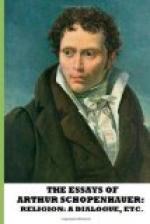of the Middle Age. Church and Faith were compelled
to disappear in the same proportion; and so in the
eighteenth century English and French philosophers
were able to take up an attitude of direct hostility;
until, finally, under Frederick the Great, Kant appeared,
and took away from religious belief the support it
had previously enjoyed from philosophy: he emancipated
the handmaid of theology, and in attacking the question
with German thoroughness and patience, gave it an
earnest instead of a frivolous tone. The consequence
of this is that we see Christianity undermined in
the nineteenth century, a serious faith in it almost
completely gone; we see it fighting even for bare
existence, whilst anxious princes try to set it up
a little by artificial means, as a doctor uses a drug
on a dying patient. In this connection there
is a passage in Condorcet’s “Des Progres
de l’esprit humain” which looks as
if written as a warning to our age: “the
religious zeal shown by philosophers and great men
was only a political devotion; and every religion which
allows itself to be defended as a belief that may
usefully be left to the people, can only hope for
an agony more or less prolonged.” In the
whole course of the events which I have indicated,
you may always observe that faith and knowledge are
related as the two scales of a balance; when the one
goes up, the other goes down. So sensitive is
the balance that it indicates momentary influences.
When, for instance, at the beginning of this century,
those inroads of French robbers under the leadership
of Bonaparte, and the enormous efforts necessary for
driving them out and punishing them, had brought about
a temporary neglect of science and consequently a
certain decline in the general increase of knowledge,
the Church immediately began to raise her head again
and Faith began to show fresh signs of life; which,
to be sure, in keeping with the times, was partly
poetical in its nature. On the other hand, in
the more than thirty years of peace which followed,
leisure and prosperity furthered the building up of
science and the spread of knowledge in an extraordinary
degree: the consequence of which is what I have
indicated, the dissolution and threatened fall of
religion. Perhaps the time is approaching which
has so often been prophesied, when religion will take
her departure from European humanity, like a nurse
which the child has outgrown: the child will
now be given over to the instructions of a tutor.
For there is no doubt that religious doctrines which
are founded merely on authority, miracles and revelations,
are only suited to the childhood of humanity.
Everyone will admit that a race, the past duration
of which on the earth all accounts, physical and historical,
agree in placing at not more than some hundred times
the life of a man of sixty, is as yet only in its
first childhood.




